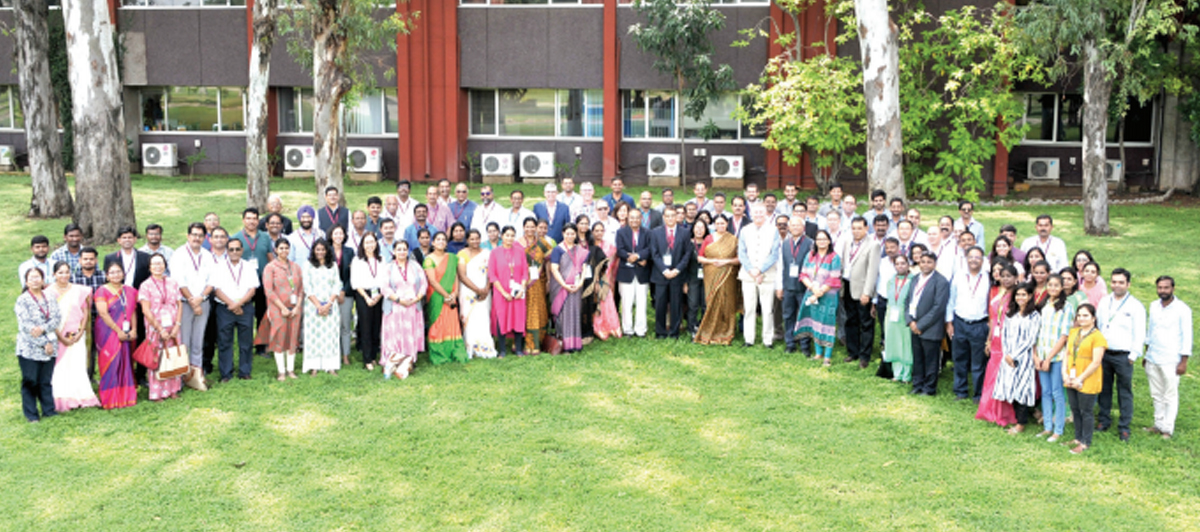
Regional Expert Consultation on Gene Editing in Agriculture and its Regulation
February 19, 2020| |
The Asia-Pacific Association of Agricultural Research Institutions (APAARI) led six other institutions in reviewing the status of regulatory policies for gene editing across the globe, particularly in the Asia-Pacific region. The Regional Expert Consultation on Gene Editing and its Regulation was held at the International Crop Research Institute for the Semi-Arid Tropics (ICRISAT) in Hyderabad, India on October 10-11, 2019 and gathered experts from 12 different countries in the region.
The Expert Consultation aimed to highlight the innovations through gene editing and their impact in the agricultural sector; review the status of regulatory policies around gene editing across the globe particularly in countries of Asia-Pacific region; provide a platform to promote adoption of science-based predictable policies for regulating gene-edited crops and breeds; provide a platform to discuss the impact of regulatory hurdles, delays and associated high cost on technology adoption; and discuss communication strategies, enabling policies for plant and animal breeding innovations.
From the two-day deliberations and the discussions, key recommendations include the following:
- Consistency can be achieved by not regulating products of plant varieties developed through the latest breeding methods if they are similar or indistinguishable from varieties produced through earlier breeding methods.
- Science-based, predictable and proportionate regulations with clear timelines are urgently required to encourage innovations. Countries should clarify the scope of their regulation for the products of gene editing at the earliest.
- Harmonization of approaches within the Asia-Pacific region is important for collaboration in research, capacity development, regulation, and trade. Efforts towards common ground should be facilitated by organizing interactive meetings among the researchers and the regulatory agencies.
- Focused programs for communicating science-based information in easy to understand language should be initiated by academics, industry, and experts from both the public and private sectors.
- Public-private partnerships should be encouraged to work in the areas of relevance to Asia-Pacific. Regional organizations such as APAARI should lead the development of network projects for smallholder farmers and consumers in the region.
- Regional collaborations and networks can also contribute to capacity building, communication strategies, policy development, and advocacy.
For more details, download the Proceedings and Recommendations from the APAARI website.
| |
You might also like:
- APAARI Releases Proceedings on Underutilized Animal Genetic Resources Workshop Proceedings
- APAARI Releases Strategic Papers and Country Reports, 2018
- GM Maize in the Philippines – A Success Story
Biotech Updates is a weekly newsletter of ISAAA, a not-for-profit organization. It is distributed for free to over 22,000 subscribers worldwide to inform them about the key developments in biosciences, especially in biotechnology. Your support will help us in our mission to feed the world with knowledge. You can help by donating as little as $10.
-
See more articles:
-
News from Around the World
- Get Instant AgBiotech News on Facebook Messenger
- Researchers Eye Sending Cotton to Space for Genetic Information
- USDA Reports Significant Agri-biotech Progress in the Philippines
- Independent Science-based Regulation Needs Defending from Activists and Community Ignorance
- Scientists Release Most Complete Genetic Map of Spanish Peppers
-
Research Highlights
- Virus Tolerant Citrus Developed Using a Combination of Biotech Tools
- Concentration of Transgenic Protein in Single Events are Comparable with that of Conventionally-bred Stacks
-
Plant
- Two Gene-Edited Traits for Rice to Increase Productivity for Rice Farmers
- Experts Pinpoint Transcription Factors Vital in Rice Caryopsis Filling
- Regional Expert Consultation on Gene Editing in Agriculture and its Regulation
-
Read the latest: - Biotech Updates (January 28, 2026)
- Gene Editing Supplement (January 28, 2026)
- Gene Drive Supplement (February 22, 2023)
-
Subscribe to BU: - Share
- Tweet

